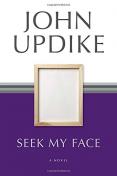BKMT READING GUIDES
Seek My Face: A Novel
by John Updike
Paperback : 0 pages
1 club reading this now
0 members have read this book
Introduction
John Updike’s twentieth novel, like his first, The Poorhouse Fair, takes place in one day, a day that contains much conversation and some rain. The seventy-nine-year-old painter Hope Chafetz, who in the course of her eventful life has been Hope Ouderkirk, Hope McCoy, and Hope Holloway, answers questions put to her by a New York interviewer named Kathryn, and recapitulates, through stories from her career and many marriages, the triumphant, poignant saga of postwar American art. In the evolving relation between the two women, interviewer and subject move in and out of the roles of daughter and mother, therapist and patient, predator and prey, supplicant and idol. The scene is central Vermont; the time, the early spring of 2001.
Editorial Review
A meditation on art, aging, and memory, John Updike's Seek My Face is the fictional equivalent of a PBS documentary on postwar American art. Seventy-nine-year-old Hope Chafetz, a painter of merit but, most importantly, wife to two major American artists, allows a young journalist named Kathryn to interview her for an online magazine. Having expected perhaps a two-hour talk over coffee, Hope is dismayed to find that her guest has brought sheaves of questions, a tape recorder, and the kind of scrupulous attention to detail--even sexual detail--that Hope would rather avoid. She gives an entire day to Kathryn, who, like memory itself, seems oblivious to Hope's need to eat, rest, or breathe fresh air.Seek My Face draws on the story of Lee Miller and Jackson Pollock, the model for Hope's first husband. These are the best parts of a slow, sumptuous, and intricately detailed novel that lacks any significant action except in retrospect. Hope's second husband is depicted as an amalgam of Andy Warhol, Roy Lichtenstein, Claes Oldenburg, and Wayne Thiebaud--a useful survey of the period, but not compelling characterization. One can sense the author folding in important art-historical points and details toward the end, like last-minute ingredients in a cake that may be too heavy to rise. Readers who stay with Hope and Kathryn through the day, however, will be rewarded with a gorgeous, resonant, and almost antimodern ending. --Regina Marler
Discussion Questions
No discussion questions at this time.Book Club Recommendations
Recommended to book clubs by 0 of 0 members.
Book Club HQ to over 90,000+ book clubs and ready to welcome yours.
Get free weekly updates on top club picks, book giveaways, author events and more








